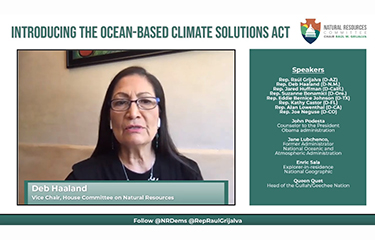A group of U.S. representatives has introduced the Ocean-Based Climate Solutions Act, a new piece of legislation centered on limiting or reversing damage to the oceans and marine ecosystems caused by climate change.
The new bill, which is 300 pages long, was co-authored by U.S. Rep. Raul M. Grijalva (D-Arizona) and U.S. Rep. Kathy Castor (D-Florida), and involves sweeping rule-making that touches on the energy and fisheries sectors. The bill includes an offshore oil drilling ban, stipulations on new offshore wind energy projects, and pushes for climate-ready fisheries and the promotion of American seafood.
“The Ocean Based Climate Solution Act does so much to bring us back up to speed as a global leader in our efforts to fight climate change,” U.S. Rep. Alan Lowenthal (D-California), another co-sponsor of the bill, said at a 20 October press conference.
The bill calls for the elimination of fish subsidies to fisheries that contribute to illegal, unreported, and unregulated fishing. It also requires foreign trading partners establish independent bodies that make annual assessments of the health of fish stocks of their domestic fisheries.
“We’re also focused on supporting our domestic seafood industry, the most sustainable in the world, and that it works on a level playing field with its competitors,” U.S. Rep. Jared Huffman (D-California) said during the press conference. “We need to get this right for our clean energy needs, but also for wildlife and our fishermen stakeholders.”
The bill also adds amendments to the Magnuson-Stevens Act, including calls for more fuel-efficient fishing vessels, either via the installation of solar panels or the retrofitting or replacement of vessels.
In addition, the bill adds new language to the Magnuson-Stevens Act that calls for the establishment of a climate and fisheries research and management program, part of a push to expand national fisheries science through improved monitoring and data collection. It also includes stipulations for supporting fisheries management approaches that add resilience to climate change to the act, including both approaches for managing species and that will take into account the socio-economic impact that climate change may have on fisheries.
Monitoring was a key issue brought up during a New England listening session on the Magnuson-Stevens Act renewel led by Huffman last month, even as that region's only research vessel canceled its upcoming expeditions.
At the same time as Magnuson-Stevens gets new language for climate-ready fisheries, the bill also creates a new program that, using grants, develop “innovative tools and approaches designed to increase the adaptive capacity of fishery management to the impacts of climate change.” The program would then use outreach to encourage adoption of any new tools developed.
Overarching those two efforts would be the creation of a “shifting stocks task force,” which would consist of 10 members – including one member recommended by each of the country’s eight regional fishery management councils. That new taskforce would focus on establishing regional quotas that are resilient to the shifting of stocks related to the effects of climate change.
The new bill will also address aquaculture with the establishment of a new “Ocean Aquaculture Research and Policy Program” that aims to “address opportunities, challenges, and innovation in restorative ocean aquaculture development, siting, and operations in [U.S.] coastal waters and [its] exclusive economic zone.” That program would prioritize restorative aquaculture, and would include a comprehensive assessment of the impacts of aquaculture operations – both positive and negative – on the environment.
“We are a nation that has long been protected and supplied by our oceans,” Huffman said. “This legislation takes a step forward.”
Members of the administration of former U.S. President Barack Obama and NOAA also came forward during the press conference to support the ocean-based action that the new bill would create.
“We all know that the oceans are in trouble, and climate change is a major contributor to that trouble, yet oceans have so far been left out of the conversation about climate solutions,” John Podesta, a former counselor to the Obama administration, said.
Former NOAA Administrator Jane Lubchenco said she is “particularly excited about the solutions that encourage climate-ready fisheries” in the new bill.
“As a scientist, I know that the ocean is often seen as a victim of climate change, but in truth, it is also a powerful source of solutions,” she said. “I think it’s high time for ocean climate action.”
Environmental groups like the Environmental Defense Fund and Oceana also welcomed the new legislation.
“EDF enthusiastically supports the blue carbon title and the authorization of increased investments in coastal resilience, adaptation and restoration. We celebrate the inclusion of provisions in the bill that would monitor and minimize carbon emissions from shipping vessels," Vice President of EDF Oceans Eric Schwaab said. "EDF also welcomes the creation of a new task force charged with responding to the management challenges brought about as fish stocks shift across state and management council jurisdictions due to climate change."
For its part, Oceana said the new bill included "common sense policies" on oceans management.
“This bill shows us our oceans can be part of the answer,” Oceana Chief Policy Officer for North America Jacqueline Savitz said. “Common sense policies like stopping the expansion of offshore drilling, supporting fisheries, protecting important habitat areas and increasing safeguards for ocean wildlife like dolphins and whales can help fight the climate change. Oceana applauds Chair Grijalva and his colleagues for introducing this important bill that gives the oceans a leading role in tackling the climate crisis.”







